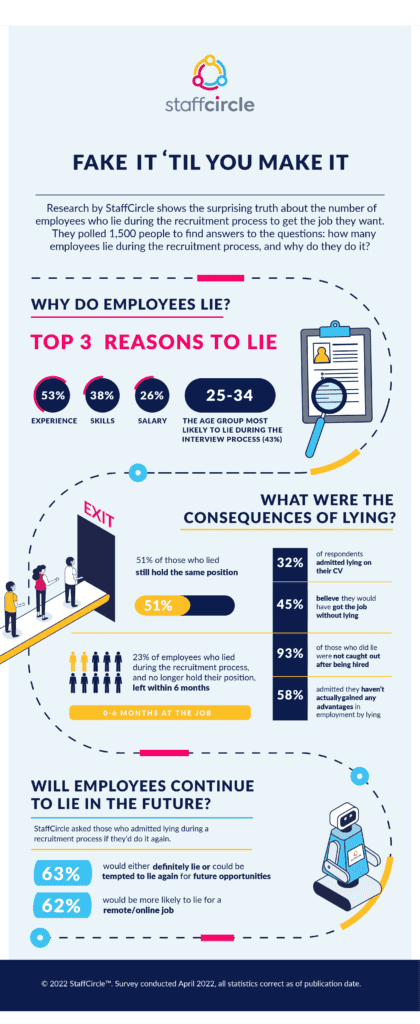This article is part of the “Resume tips” series.
Talented employees are the backbone of any successful company. But competition for talent is fierce in today’s economic climate. A new survey from StaffCircle suggests the fight for a top job may have gone too far, with the study revealing that 32% of the respondents have lied on their CV.
Lies on a CV are complex problems to solve. The HR department needs to use a variety of tools to catch a liar. It can take a lot of resources to perform rigorous background checks on all candidates. Employee performance management software could help, but often only in the later stages and when the candidate is already part of the team. It can be much more useful to understand the reasons candidates have lied. The new research sheds light on these vital issues.
Top 3 Lies on Employees’ CVs
The data shows that 25-34-year-olds are the most likely to slip a lie on a CV. The demographic is at the stage where they are fresh out of education without much experience under their belt. The pressure to get on the career ladder is high. The most common things candidates lie about are:
1. Work experience
Over 50% of the 1,500 people surveyed said they lied to cover their lack of experience. Candidates know employers are looking for work experience. Many job postings these days seek multiple years’ worth of experience, even for entry-level roles. Slipping in a few extra years can seem like a necessary evil to many candidates.
Employers should be careful about focusing on work experience too closely. It’s crucial to assess a candidate’s talents and abilities. Skills like problem-solving and proactivity can help in many jobs, even if the candidate doesn’t have years of work experience.
Reference checks are also important. Whilst they can be time-consuming, verifying the candidate’s experience shouldn’t be an afterthought. Savvy interviewers also know how to assess a candidate’s experience during the interview stage.
2. Skills
Research showed the second most common lie on a CV revolves around the candidate’s skills. 38% of respondents admitted that skills are something they’ve lied about. Though the study doesn’t probe further into what this means, it could be that respondents over-exaggerate capabilities to attract a more senior role.
Spotting skill-based lies on a CV can be hard, and background checks won’t necessarily help. Competency-based interview techniques are crucial for identifying candidates’ strengths and weaknesses. It’s important to test the relevant skills for each role.
A performance management system can also help after the candidate starts in a role. Companies should continuously assess and monitor employees. Performance management helps ensure employees are working on the roles they are most suited for.

3. Previous salary
Work experience and skills are lies candidates tell on a CV. But respondents admitted they’ve told lies during the later stages of the recruitment process. 26% of people said they’ve lied about their previous salary.
Lying about your previous salary when applying for a new job might seem odd. But candidates might feel that giving an impression of a higher salary in the previous role could help land a better salary in the new role.
Lying about your salary can be much easier to spot. Employers have access to candidates’ previous tax paperwork. The paperwork can reveal past salaries and accurately show if the candidate was lying.
Is lying on a CV a good idea?
As employers are scrambling to spot the lies on candidates’ CVs, should candidates keep lying? According to the survey, 93% of those who admitted to lying did not get caught. 40% of them held the position they had lied to get!
But lying on a CV is never a good idea. The majority of those who admitted to lying didn’t feel they gained an edge over competitors. Some even faced consequences. 14 out of the 1,500 candidates had employers take legal action against them.
So lying on a CV is not worth it. Even if you get past the reference checks, you could end up in a role you’re not fit to perform. If your skills don’t actually match those of the role, your job satisfaction can suffer. In fact, employers and employees alike must make sure people are in the right roles. It guarantees higher productivity, well-being and job satisfaction. So stick to the truth!